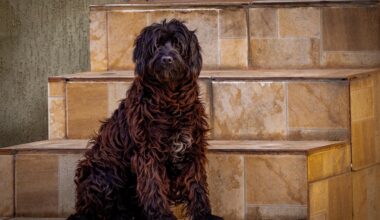Probiotics and Their Role in Alleviating Anxiety in Cats
In recent years, pet owners have become increasingly aware of the impact of diet on their cats’ behavior. A balanced diet includes not only essential nutrients but also probiotics, which play a crucial role in maintaining gut health. Probiotics are live microorganisms that, when ingested in adequate amounts, confer health benefits to the host. For cats, these microorganisms can enhance the digestive system, leading to better nutrient absorption and overall health. Interestingly, research has shown a strong link between a cat’s gut health and its behavior, particularly in terms of stress and anxiety. Probiotics can help mitigate anxiety symptoms, thus promoting a calmer and more balanced feline disposition. Incorporating probiotic-rich foods or supplements in your cat’s diet can be an effective strategy for alleviating anxiety, making it crucial for cat lovers to understand the benefits of these microorganisms.
Stress and anxiety in cats can manifest in numerous ways, including aggression, excessive grooming, and litter box avoidance. Cats are creatures of habit, and any disruption to their routine can lead to stress-induced behavioral issues. This is where probiotics can make a significant difference. Supporting a healthy gut microbiome improves the overall emotional well-being of your pet. While stress can deplete beneficial bacteria, probiotics can help restore balance and promote a stable environment for your cat. In addition to restoring gut health, probiotics can enhance immunity, helping cats to cope better with stressors. Veterinarians recommend including probiotics in your cat’s diet, especially during stressful periods like moving to a new home or introducing new pets. Furthermore, the use of probiotics alongside behavioral modifications can yield better results in managing anxiety symptoms. Keep in mind that not all probiotics are created equal, and it is essential to choose products specifically formulated for felines to ensure their effectiveness in alleviating anxiety and improving behavior.
The Science Behind Probiotics
Research has increasingly delved into the connection between gut health and mental well-being. Studies demonstrate that gut microbiota influence brain function and behavior. Specifically, the gut-brain axis is the communication pathway between the central nervous system and the gastrointestinal tract. Probiotics help maintain a balanced gut microbiome, which can positively impact mood regulation and anxiety levels in cats. Therefore, understanding the science of probiotics becomes paramount for cat owners. The process begins with introducing live beneficial bacteria into the cat’s digestive system. This process not only balances intestinal flora but is also believed to impact the production of neurotransmitters like serotonin, which contributes to mood stability. By fostering a healthy gut environment, the likelihood of behavioral issues may significantly decrease. Thus, as cat owners look to improve their pets’ well-being, incorporating probiotics emerges as a highly effective approach. Consult with a veterinarian to explore optimal probiotic formulations tailored to your cat’s unique needs.
Nutritional choices play a vital role in a cat’s overall health and behavior. Naturally occurring probiotics can be found in various pet food options, including fermented foods like yogurt and specialized kibble. Each source of probiotics contains different strains of bacteria, offering unique benefits to the feline gut. For example, Lactobacillus and Bifidobacterium are commonly found in many probiotic supplements and have been researched for their positive effects on gut health and behavior. However, cat owners should be careful regarding the amounts provided and should avoid human products which can be harmful to cats. Additionally, while probiotics may provide significant advantages, they should complement a well-rounded diet. Pet food manufacturers increasingly recognize the importance of probiotics and are formulating products that include these beneficial microorganisms. Thus, when selecting a food option, always consider those that highlight the inclusion of probiotics to support your cat’s anxiety management effectively. A combination of healthy nutrition, regular exercise, and probiotics can work synergistically to ensure better emotional health for your pet.
Identifying signs of anxiety in cats is crucial for early intervention and utilizing probiotics effectively. Some common indicators include hiding, excessive vocalization, and abrupt changes in eating habits. Additionally, behavioral changes such as aggression or destructive tendencies may signal increased anxiety levels. Cats may also display physiological reactions to stress, including excessive grooming or changes in litter box habits. Understanding these behaviors can help cat owners decide when to consult a veterinarian for possible probiotic treatment. Behavioral observation and a calm environment are essential in mitigating anxiety symptoms. Incorporating probiotics in the dietary regime can enhance coping mechanisms for cats, leading to desirable behavioral changes. While probiotics contribute positively, they should not replace conventional treatment options for severe anxiety. In many cases, a multifaceted approach that combines probiotics with behavioral therapy and environmental enrichment can provide the most effective relief. If you notice persistent anxiety in your cat, it is always best to consult with a veterinarian who can provide personalized recommendations for your pet’s well-being.
To further enhance your cat’s emotional health, consider additional supportive measures alongside probiotics. Environmental enrichment can play a vital role in reducing stress and anxiety levels. Modifications such as providing interactive toys, scratch posts, and climbing spaces can make a difference in creating a comforting atmosphere for your pet. Additionally, ensuring a consistent routine can help maintain their sense of security. For anxious cats, the integration of calming music, pheromone diffusers, or safe and cozy hiding spots can contribute positively. Combining these environmental changes with a proper diet—including probiotics—can greatly benefit your cat’s overall well-being. Always observe how your cat responds to new changes and adapt accordingly. Ultimately, this holistic approach enables cat owners to improve their pets’ mental health and reduce anxiety symptoms. A happy cat leads to a harmonious household, which is the goal of every cat lover. Therefore, staying informed on the various solutions available for handling anxiety is critical for providing optimal care for your beloved feline companion.
The Future of Probiotics in Cat Care
The future of probiotics in feline care is bright, particularly as more research emerges on their effectiveness and benefits. Innovations in veterinary medicine and nutrition are advancing rapidly, leading to new discoveries about the microbial impacts on cats. Both researchers and pet owners are beginning to recognize the importance of gut health as a factor in emotional and behavioral issues in felines. Consequently, enhanced formulations of probiotics specific to cats are likely to hit the market. As scientific understanding deepens, veterinarians will be better equipped to recommend tailored probiotic solutions for anxiety management. Ongoing studies may offer insights into the most effective bacterial strains and delivery methods, further enhancing their therapeutic potentials. This growing enthusiasm around probiotics offers the promise of healthier, happier cats. Pet parents are encouraged to stay informed about these advancements and to consider incorporating innovative probiotic-rich products into their cat’s diet. As knowledge of gut health and its effects on behavior improves, proactive cat owners will continue to refine their approaches. The overall goal is to support felines in leading long, healthy lives, contributing to a greater focus on mental and emotional well-being.
In summary, probiotics have emerged as a key player in alleviating anxiety in cats through dietary means. The relationship between gut health and emotional well-being is increasingly acknowledged among veterinarians and researchers, leading to greater emphasis on integrating probiotics in cat diets. Understanding the science and practical applications of these beneficial microorganisms enables cat owners to make educated dietary choices for their furry companions. Recognizing the signs of anxiety and responding proactively can foster significant improvements in a cat’s quality of life. While probiotics are a valuable tool in managing feline anxiety, they should be part of an overall strategy that incorporates proper nutrition, behavioral modification, and environmental enrichment, all contributing to a happier and healthier cat. With meticulous attention to dietary choices, behavior observations, and veterinarian consultations, pet owners can equip their cats to thrive emotionally. The knowledge surrounding probiotics will undoubtedly continue to evolve, paving the way for more effective means of enhancing feline well-being. By prioritizing gut health, we pave the way for happier, doing right by our beloved cats.


